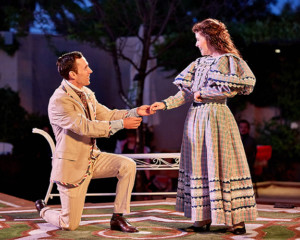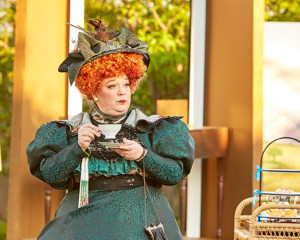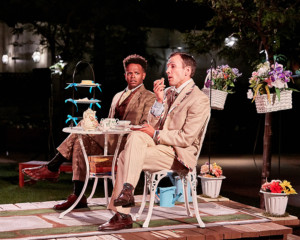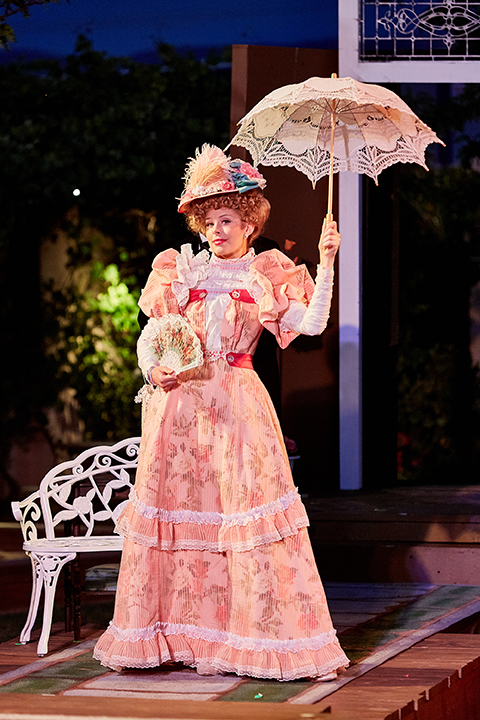
Archana Asthana
India Post News Service
The outdoor festival at Wente Vineyards is an annual summer staple in the Bay Area with Livermore Shakespeare Festival bringing choice productions for their patrons. This week on an unusually balmy night, against the backdrop of all things wine, ardent fans of Oscar Wilde turned out to enjoy the opening night of “The Importance of Being Earnest”, a most beloved play for all ages.
The satirical comedy spanning Victorian and Edwardian England is a brilliant commentary on the life and times of the aristocracy and their unique perspectives, with heavy doses of absurdity and idiosyncratic humor embedded in the dialogues and situations. The couture, mannerisms, witticism and locales all enrich the already successful play, and the cast brings alive each nuance and mannerism in the characters on stage.
Wilde sets the tone with the title, allowing musings on the pun between, “earnest” and the name Ernest, a fictitous individual created by the male protagonists to escape their burdensome social obligations. He also coined the term “Bunburying”, a strategem used as an excuse for avoidance of relatives and circumstances; the chronic illness of Bunbury is used effectively for mirthful dialogues throughout. This is also the ruse the males use to rendevous and woo their amorous interests. Wilde mocks incessantly the trivial matters as serious and the serious matters with studied triviality, delightfully juxtaposing this theme in his dialogues.

Throughout the full length play that was presented unchanged and adroitly directed by Domenique Lozano, dialogue was center stage; with many a quip, bon mots, epigrams and puns that delighted the audience. The engagement was so complete that it seemed all prongs of the play – the director, actors and audience were in on the farcical mockery of the English Victorian society.
Gwen Loeb, as the formidable Lady Blacknell and Algernon’s Aunt Augusta stole the show as the overbearing matriarch who could shrivel with her disdain and haughty glares without speaking a word; rendered even more imposing by voluminous gowns, designed by Jonathan Singer. Of course, her most memorable utterance remains, “a handbag” encapsulating incredule and scandal in equal measure, at the discovery of the obscure parentage of potential son in law, Jack Worthing.
As a means of imparting respectability to the fact that said handbag was found in a cloakroom at the Victoria station terminal, Jack clarifies his posotion saying “The Brighton Line” which serviced the more fashionable up town to the side-splitting roars of an appreciative crowd.
The superbly cast dandy lords, William Hoeschler, debuting with the company as the dashing Algernon Moncrief; and the twinkle-eyed Jared Manders characterises a beguiling Jack Worthing, charming and gallivanting about while engaging in amorous pursuits. The young ladies; Jack’s young ward, Deborah Lagin as Cecily and the enchanting Katherine Romans as Gwendolyn, portray proper ladies with an interest in marrying a man named “Ernest”. Quips Cecily, “the only real safe name is Ernest”, and “I pity any poor married woman whose husband is not called Ernest”.

The puritan Miss Prism, adroitly played by Mary Ann Rodgers, provides the key to the mystery of Jack’s discovery in a handbag as a result of her own absent mindedness, whereby she mistakenly places her manuscript in the perambulator and the baby in the handbag. The happy ending for her is the union with Dr. Chasuble (Blair Leatherwood). Fortuitously, Jack turns out to have been christened Ernest after all after his late father, and all’s well that ends well with couples united.
The rejection of oppressing societal norms through a repertoire of astoundingly witty dialogue, astute performances, and ridiculous crossroads offer an insight into redefining the aesthetic and finding delight in one’s life. Wilde deserves a kudos for this profound take on a trivial play and demonstrating his modern thinking – ahead of the times!.






